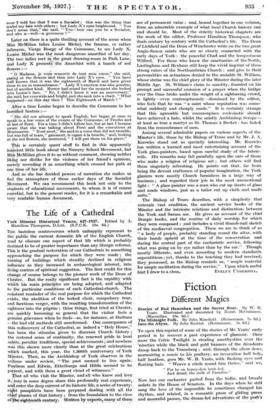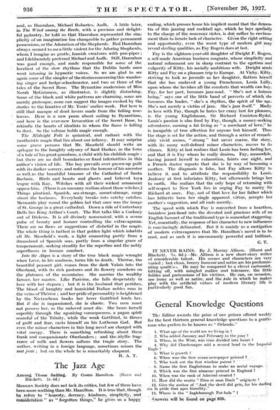Fiction
Different Magics
Stories of Red Hanrahan and the Secret Rose. By W. B. Yeats. Illustrated and decorated by Norah McGuinness. (Macmillan. 10s. 6d.)
To open this reprint of some of the stories of Mr. Yeats' early period is to recover a past experience of glamour. Once more the Celtic Twilight is stealing amethystine over the 'nineties while the black and gold banners of the decedents droop back to the Venusberg ; and, through the silver deWs, murmuring a music to his psaltery, an invocation half holy, half heathen, goes Mr. W. B. Yeats, with flashing eyes and floating hair. " Weave a circle round him thrice," said we,
" For he on honey dew hath fed, And drunk the milk Of Paradise."
Now has our enchanter parted from the Sidhe, and broods sedate in the House of Senators. In the days when he still sang the love of the impossible he sometimes changed his rhythm, and related, in a romantic prose of gliding paces and mournful pauses, the dream-led adventures of the poet's soul, as Hanrahan, Michael Robartes, Aodh. A little later, in The Wind among the Reeds, with a precious and delight- ful pedantry, he told us that Hannthwurepreseated the sink
of.an imagination too changeable to gather permanent possessions, or the Adoration of the Shepherds. Red Hanrahan always seemed to me a little violent for the Adoring Shepherds, whom I imagiae as gentle, faunish creatures with pan-pipes ; and I deliberately preferred Michael and Aodh. Still, Hawaiian was good enough, and made responsible for some of the
loveliest of the slow rhythms that the Dublin bards once went intoning in ,hypnotic voices. • So we. are. glad to see again sonic of the simpler of thestories concerning this wander- ing singer and hedge-schoolmaster, and two. or three of the tales of the Secret Rose. The Byzantine modernism of Miss Islorah McGuinness, as illustrator, is slightly disturbing. Some of the black and white patterns arc charming, some are merely grotesque, none can suggest the images evoked by the stories to the fanatics of Mr. Yeats' -earlier work. But here is still that masque of dead lovers made from the falling rose-
' leaves. Here is a new poem about sailing to Byzantium, and here is the ever-new Invocation of the Secret Rose, to rekindle the hearts of idealists in whom the flame is falling to dust. So the volume holds magic enough.
The Midnight Folk is quizzical, and radiant with the pantheistic magic that lies about our infancy. It may surprise some grave persons that Mr. Masefield should write an epilogue to the haughty odyssey of Sard Harker, in the form of a tale of his great-grandson, a child with his childish magic ; but there are no dull boundaries or fixed inferiorities. in this author's vision of life. The boy prevails over grown-up guilt with its darker sorcery, and redeems the honour of his ancestor as well: as the beautiful treasure of the Cathedral of Santa Barbara. Birds and beasts and ghosts and- beloved toys league with Kay. Witches with all their wicked armament oppose him. (There is an uncanny realism about those witches.) Things piratical, Spanish, sea-strange, sunset-strange, surge about the horizons. Everybody breaks into catchy catches. Mermaids play round the golden lad that once was the image of St. George in .a great cathedral. Down a ride of Canterbury Bells lies King Arthur's Court. The Rat talks like a Cockney out of Dickens. It is all divinely nonsensical, with a serene pulse of beauty and honour Controlling the extravaganza. There are no flaws or suggestions 'of disbelief in the magic. The whole thing is bathed in that golden light which inhabits all Mr. Masefield's work, a light emanating partly from a dreamland of Spanish seas, partly from a singular grace of temperaMent, seeking steadily for the superfine and the nobly superfluous in human conduct.
Into the Abyss is a story of the true black magic wrought when Love, in his madness, turns life to death. Therese, the beautiful peasant girl, comes from the dark Valais into the Oberland, with its rich pastures and its flowery meadows on the plateaux of the mountains. She marries the wealthy farmer, her master. Like Parisian, she falls desperately in love with her stepson ; but it is the .husband that perishes. The blood of haughty and homicidal Italian nobles runs in the veins of Therese ; and her pride of personality is heightened by the Nietzschean books her lover Gottfried lends her. But if she is impassioned,- she is chaste. Two men must not possess her, so the unloved must die. She bears herself superbly through the agonizing consequences, a pagan spirit scornful of the Trinity, -while the' weak Gottfried, in throes of guilt and fear, casts himself on his Lutheran God. But even the minor characters in this long novel are charged with vital energy. There is something refreshing about these frank and compassionate Oberlawiers ; • and thefidyllic frag- rance of milk and flowers softens the tragic story. The author, writing in a foreign language, sometimes misses the mot juste ; but on the whole he is remarkably eloquent.
R. A. T.























































 Previous page
Previous page